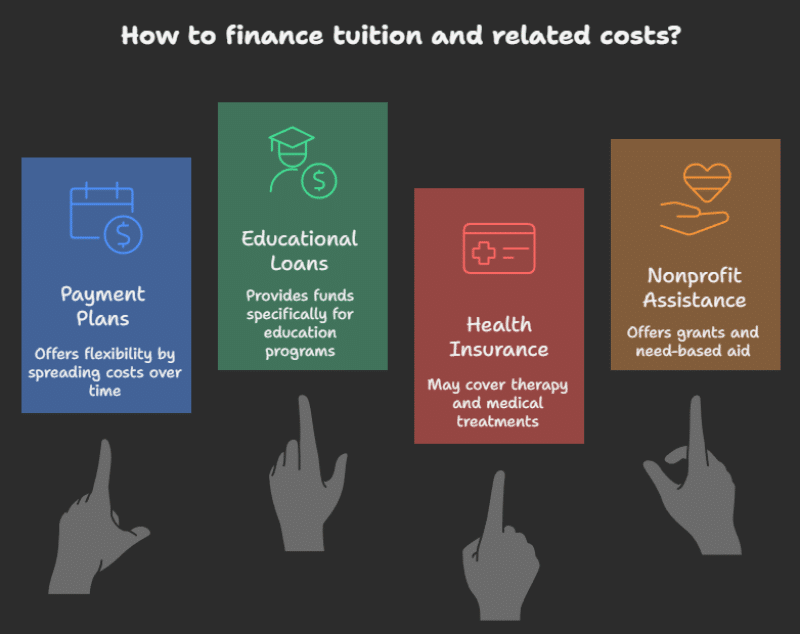Choosing a Therapeutic Boarding School for Troubled Teens is one of the most important — and often one of the most expensive — decisions a family can make. These programs combine accredited academics with licensed therapy, offering the structure and support teens need to recover emotionally, socially, and academically.
But understandably, many parents have the same first question: “How much does it cost, and can we afford it?”
In this article, we’ll break down what influences tuition, explore realistic financing options, and share how scholarships or insurance coverage may help. With the right information and guidance, families can make confident, well-informed choices for their child’s well-being and education.
Key Takeaways
- The average cost of Therapeutic Boarding Schools for Troubled Teens ranges from $7,500 to $12,000 per month.
- Tuition typically includes academics, therapy, housing, and meals.
- Families can explore payment plans, loans, scholarships, and partial insurance coverage.
- Scholarships and nonprofit grants are available but may require early application.
- Transitional programs can provide additional support for long-term success.
Understanding the Costs of Therapeutic Boarding Schools
The cost of a Therapeutic Boarding School for Troubled Teens varies widely depending on factors like location, level of care, and program duration.
Typical Price Range
| Program Type | Average Monthly Cost | Typical Duration |
|---|---|---|
| Therapeutic Boarding Schools | $7,500 – $12,000 | 9–18 months |
| Residential Treatment Centers | $10,000 – $20,000 | 6–12 months |
| Wilderness Therapy Programs | $500 – $1,500 per day | 2–3 months |
Note: Costs may vary depending on therapy intensity, medical needs, and academic services offered.
While these numbers can seem daunting, it’s important to remember that therapeutic boarding schools provide both education and therapy — essentially combining what would normally be two separate costs (school tuition + mental health care) into one structured program.
What’s Included in Tuition?
Most schools are all-inclusive, meaning tuition typically covers:
- Academic instruction and materials
- Individual, group, and family therapy sessions
- Room and board (housing, meals, activities)
- Life skills and personal development programs
- On-site medical and counseling support
Some programs may have additional fees for transportation, recreational trips, or medical treatment not covered in the base tuition. Always request a transparent cost breakdown before enrolling.
Financing Options for Families
For many families, paying tuition outright isn’t realistic — and that’s okay. There are several financing and payment solutions designed to make these programs accessible.
1. Payment Plans
Many schools offer flexible monthly or quarterly payment plans, allowing families to spread costs over time instead of paying in full upfront.
2. Educational Loans
Specialized education loan providers, such as MediCredit, Clark Behavioral Health Financing, or Education Loan Finance (ELFI), can help families borrow funds specifically for therapeutic or special education programs.
3. Health Insurance Coverage
While insurance rarely covers full tuition, it may partially cover therapy, psychiatric evaluations, or medical treatment provided at the school. Families should contact their insurance provider and the program’s admissions team to determine eligibility.
4. Nonprofit Assistance
Some nonprofit organizations and community foundations provide grants or need-based aid for families seeking behavioral health treatment for their children.
Examples include:
- The Mental Health Fund (for therapy and support)
- UnitedHealthcare Children’s Foundation Grants
- The National Alliance on Mental Illness (NAMI) – local chapters may help with resources and referrals

Scholarships for Therapeutic Boarding Schools
Although scholarships for Therapeutic Boarding Schools for Troubled Teens are limited compared to traditional schools, some programs and partner organizations do provide need-based or merit-based scholarships.
Common Scholarship Types
| Scholarship Type | Eligibility Criteria | Typical Award Range |
|---|---|---|
| Need-Based | Family income and financial situation | Partial tuition coverage |
| Merit-Based | Academic performance, leadership, or behavior progress | $1,000–$5,000 |
| Nonprofit or Private Grants | Families in crisis or with special needs | Varies by organization |
Some schools also maintain internal scholarship funds or work with partner organizations to offset costs for families who qualify.
When researching programs, always ask:
- Does your school offer financial aid or scholarships?
- Are there partnerships with nonprofits or community organizations?
- What documentation do we need to apply?
Comparing Costs vs. Value
While the financial aspect is significant, it’s also important to weigh the long-term benefits of a therapeutic program against the cost of continued struggles.
| Without Intervention | With Therapeutic Boarding School |
|---|---|
| Academic decline or school dropout | Academic recovery and college readiness |
| Ongoing therapy or hospitalizations | Comprehensive care in a structured setting |
| Strained family relationships | Restored communication and emotional healing |
| Lack of independence or motivation | Development of life skills and accountability |
Many families who’ve enrolled their teens in therapeutic boarding schools view the investment as a turning point — one that helps their child regain confidence, stability, and a path toward success.
The Role of Transitional and Failure-to-Launch Programs
For older teens or young adults who have completed a therapeutic program, failure to launch programs or young adult transitional programs can serve as the next step.
These programs help participants:
- Develop independence and self-discipline
- Build academic or vocational skills
- Manage responsibilities like budgeting, work, and personal health
- Strengthen emotional regulation and confidence
These follow-up services ensure that the emotional and academic gains achieved at therapeutic schools continue into adulthood.
Conclusion: Financial Planning That Supports Healing
The cost of a Therapeutic Boarding School for Troubled Teens can be significant, but families don’t have to navigate it alone. With transparent communication, creative financing options, and available scholarships, the right program becomes both possible and transformative.
The investment isn’t just financial — it’s emotional, educational, and generational. It’s about giving your teen the tools to thrive again.
Contact Help Your Teen Now to help your teen now. Our team can guide you through comparing schools, understanding financial aid, and choosing a program that aligns with your family’s needs and goals.






0 Comments